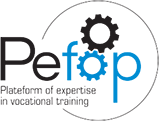Regional sharing workshop on support for the operationalization of vocational training policies

The first year of Pefop's activities has been very busy with the conduct of multi-actor participatory diagnostics and the implementation of the Support Programmes for the Operationalisation of Vocational Training Reforms (Procor) in 3 partner countries of the 1st phase (Burkina, Mauritania, Senegal), the Support Programme for Côte d' Ivoire, which is currently being developed and will start in 2017. At the same time, the year 2016 also saw the gradual construction of the networking process, which resulted in the launch of a specific website dedicated to Pefop for the benefit of vocational training actors in Africa.
In order to share, revisit and discuss these experiments in supporting the operationalization of vocational training policies with a larger number of key players on the continent, the IIEP-UNESCO Dakar organizes regional sharing workshops (three over the five years of this first phase of the Pefop), with a threefold objective: 1) to report on and discuss the programme's progress and results, 2) to deepen knowledge and thinking on selected TVET issues, 3) Enhance the networking among TVET actors.
The first regional workshop, held from 16 to 18 February 2017 in Lomé, Togo, brought together more than 60 representatives from 10 African countries, as well as specialized networks and technical and financial partners in vocational training in Africa.
Click here to read the synthesis report of the Lomé Workshop (in French)
The aim was not to conduct technical discussions on the methodological aspects of the Pefop activity but to discuss, on the basis of the realities and contexts specific to the ten invited countries, a selected number of themes in order to benefit from a fair amount of time for discussions on each theme selected:
- Lessons learned from the diagnosis process of the obstacles to operationalizing vocational training policies (experiences in Burkina Faso, Mauritania and Senegal): Relevance of the diagnosis, main problems identified, mobilization of stakeholders around priorities identified, carrying the diagnosis...
- Drawing up a contribution programme to TVET policies on the basis of such a diagnosis (examples of Mauritania): proposed solutions to overcome the obstacles identified; how to ensure that it is anchored in national vocational training strategies and policies? How to mobilize the most relevant national and international expertise to achieve this? What role for networks and inter-country exchanges?
- Networking and sharing of experiences and good practices to strengthen vocational training in Africa: a specific website of the Pefop at the service of the actors: what form of exchange to organize? Which collaborative tools to develop? What are the priorities for structuring exchanges? Which working groups or communities of practice would be most appropriate for the regional context?
- Mutualization of resources and tools to remove some of the obstacles identified: inventory of current initiatives; what are the constraints encountered? Some reflections on the role that Pefop could play in supporting mutualization

